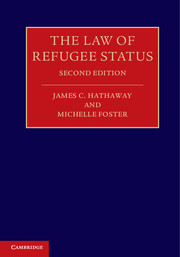Book contents
- Frontmatter
- Contents
- Acknowledgments
- Table of cases
- Table of treaties and other international instruments
- Abbreviations for courts and tribunals cited
- Introduction
- 1 Alienage
- 2 Well-founded fear
- 3 Serious harm
- 4 Failure of state protection
- 5 Nexus to civil or political status
- 6 Persons no longer needing protection
- 7 Persons not deserving protection
- Index
- References
2 - Well-founded fear
Published online by Cambridge University Press: 05 July 2014
- Frontmatter
- Contents
- Acknowledgments
- Table of cases
- Table of treaties and other international instruments
- Abbreviations for courts and tribunals cited
- Introduction
- 1 Alienage
- 2 Well-founded fear
- 3 Serious harm
- 4 Failure of state protection
- 5 Nexus to civil or political status
- 6 Persons no longer needing protection
- 7 Persons not deserving protection
- Index
- References
Summary
The hallmark of a Convention refugee is her inability or unwillingness to return home due to a “well-founded fear of being persecuted.” Not all forced migrants qualify as refugees in law: only those who face a genuine risk of being persecuted for a Convention reason in their own country are entitled to the rights set out in the Convention. The scope and meaning of the “being persecuted” inquiry – which includes both identification of a relevant serious harm and a concomitant failure of state protection – will be discussed in Chapters 3 and 4, while this chapter addresses the notion of well-founded fear.
It is generally asserted that “well-founded fear” entails two requirements. The first criterion is that the person seeking recognition of refugee status perceive herself to stand in “terror of persecution”; her very personal response to the prospect of return to her home country must be an extreme form of anxiety that is neither feigned nor overstated. Second, this subjective perception of risk must be consistent with available information on conditions in the state of origin, as only those persons whose fear is reasonable can be said to stand in need of international protection. Thus, for example, the UN High Commissioner for Refugees (“UNHCR”) opines:
To the element of fear – a state of mind and a subjective condition – is added the qualification “well-founded.” This implies that it is not only the frame of mind of the person concerned that determines his refugee status, but that this frame of mind must be supported by an objective situation. The term “well-founded fear” therefore contains a subjective and an objective element.
- Type
- Chapter
- Information
- The Law of Refugee Status , pp. 91 - 181Publisher: Cambridge University PressPrint publication year: 2014
References
- 3
- Cited by

